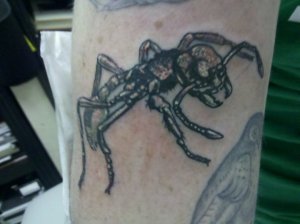What to do when your kid wants a tattoo!
 There are a lot of younger people today who are very interested in tattoos. In many cultures tattoos are used as a rite of passage from youth to adulthood, and in our Western culture it is no different. The lack of culturally-based rites of passage and tests of maturity leads many teenagers to seek alternate forms of self-challenge, and tattooing is currently high on that list.
There are a lot of younger people today who are very interested in tattoos. In many cultures tattoos are used as a rite of passage from youth to adulthood, and in our Western culture it is no different. The lack of culturally-based rites of passage and tests of maturity leads many teenagers to seek alternate forms of self-challenge, and tattooing is currently high on that list.
Children are only tattooed usually by indigenous or tribal groups to whom it is a cultural staple. Occasionally there will be a photograph of a child wearing airbrushed tattoos (which are painted on) in a magazine, but actual children are extremely rarely tattooed. If they are, it can be considered child abuse.
Although most jurisdictions outlaw the tattooing of minors, many children and teenagers will tattoo themselves at home, using sewing or other needles and common household dyes and inks. This can be extremely dangerous; using an unsterilized needle or one that has been used on another person can transmit disease or cause serious infections. Home-made tattoos tend to be deeper in the skin surface than professional tattoos, and this can lead to infections that cause excessive scarring.
Most commonly found dyes and inks in home use are not inert and can cause allergic reactions or other problems. Young people should NOT use household items to tattoo themselves; this is a given. That they WILL do it, is incontestable. Educating young people and explaining to them that sharing needles (no matter what sort of home “sterilization” they invent) can transmit HIV, hepatitis, and bacterial infections, is a good beginning; also it may help to explain that running a needle through flame, boiling it, or soaking it in alcohol or antibacterial wipes will not kill all bacteria or viruses that may be present.
 In addition, a home environment contains many bacteria and other germs that could infect a fresh tattoo. Lack of proper knowledge about cross-contamination and bloodborne pathogens can put kids at serious risk when they get tattooed in a home environment.
In addition, a home environment contains many bacteria and other germs that could infect a fresh tattoo. Lack of proper knowledge about cross-contamination and bloodborne pathogens can put kids at serious risk when they get tattooed in a home environment.
Since minors can not obtain a legal tattoo, they will often try to use fake ID to do so,and try going to a real studio instead of someone’s house. Usually shops can tell when they’re presented a fake ID, but a very well made one can occasionally slip through. Especially a real ID that belongs to someone who looks similar to the kid…
Parents should know that professional studios are not pleased about this; parents should always attempt to contact the studio where their child claims to have received a tattoo. Studios often are required by law to keep consent forms for up to two years, and can usually provide a copy of the false identification that was used. This is not negligence by the studio, but fraud by the minor. In some states the studio can prosecute the minor and their parent. Parents should make sure that their teenagers have no access to their wallets and purses.
When a teenager is nearing eighteen and the age of consent, parents should do research with them into studios they may frequent or patronize. It may be reassuring for parents to know that the studio is clean and reputable. Minors are often not welcome in tattoo studios without a parent; this can be a good opportunity for parents to ensure that if their teenager decides to get tattooed they are at least in a situation that is not unsafe or unhealthy.
Every professional tattoo shop should have an autoclave which is regularly spore tested, disposable latex or nitrile gloves should be used, and all workers there have proper health and safety training. Go with your kid, ask questions. We’re happy to explain all this stuff to you. We want all of our clients to be safe.
Bringing your teenager with you to investigate their options may also discourage them from performing unsafe tattoos on themselves at home, and may even dissuade them from getting a rebellion-motivated tattoo at all. After all, if parents approve, many teens won’t participate.
And if they decide to get one anyway, you will know where they’re going, and that they won’t be risking their health for it.
(originally published here)
